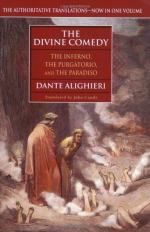|
|
The Inferno Canto XXXIII
The sinner raises his head, wiping his mouth upon the other's hair, and though grieved by what he tells continues, hoping it will bring infamy to the one he chews. He identifies himself and the other as Count Ugolino and Archbishop Ruggieri respectively. Ugolino betrayed the Guelf party of Pisa by conspiring with Ruggieri, the leader of the Ghibelline party, to get rid of one of his Guelf competitors; however, having thus weakened the Guelf party, Ruggieri imprisoned Ugolino as well as four of his sons and grandsons. Ugolino describes how he watched his sons starve to death in the prison before going crazy and dying himself of starvation. After recounting the terrible story he resumed his bite upon the other's skull with renewed vigor. Dante condemns the city of Pisa for it's horrible history, and suggests that the islands of Caprara and Gorgona move to close up the mouth of the river Arno, and thereby drown Pisa. Moving into the third round, Dante describes a new class of traitors frozen in the same manner except that their faces are raised. Their tears collect in the hollows of their eyes and freeze into clouded ice goggles. This round is called Ptolomæa after Ptolomæas who murdered his father-in-law and his two sons when they were dining with him. Sinners who have betrayed those to whom they gave hospitality are punished here. Dante feels a wind and asks Virgil where it comes from, but is denied an answer for the present. One of the souls asks Dante to remove the ice from his eyes, and Dante assents on the condition that he tells them his story. He agrees. "I am Friar Alberigo, I am he of the fruits from the ill garden, who here receive dates for my figs." Canto XXXIII, pg. 178 Alberigo killed his brother and his brother's son during the fruit course of a dinner at his house. Dante is surprised to hear his identity because he believes the Friar to be yet alive. Alberigo reveals that often the souls headed for Ptolomæa begin their suffering even before their bodies leave the world of the living. He further informs them that a demon takes over the body of one who commits a sin of this class and rules it until the body dies. The soul of the still-living Ser Branca d'Oria who murdered his father-in-law, Michel Zanche, with the help of his nephew, lies near the Friar as well. Dante affirms that he is not dead, but when the Friar asks Dante to remove the ice from his eyes he refuses and deems it a courtesy to be rude to such a sinner.




